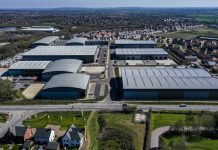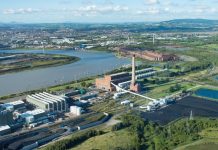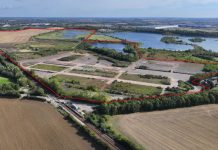The West Midlands’ attractiveness as an investment destination proved resilient amid the COVID-19 pandemic, with the region seeing only a slight decline in projects and an increase in its share of the UK market in 2020, according to the EY 2021 UK Attractiveness Survey which launched today.
The West Midlands secured 61 inbound Foreign Direct Investment (FDI) projects in 2020, down 4.7% from the 64 achieved in 2019. This was a much smaller contraction than the 12% decline in overall UK projects (from 1,109 to 975) and the 13% decline in overall European projects (from 6,412 to 5,578).
The good performance relative to the rest of the country helped propel the West Midlands’ share of UK projects from 5.8% to 6.3%. The region secured the fifth highest number of projects among all UK regions and nations in 2020 – maintaining its 2019 ranking. London secured the most projects in the country with 383.
The West Midlands’ top sector was digital technology, which saw 11 projects in the region in 2020, slightly down on the 13 in 2019 – a decline in line with UK trends. The next largest sectors were transportation manufacture and supply with nine projects (down from 13 in 2019), agri-food with seven (up from six in 2019), machinery and equipment with seven (down from 13 in 2019) and business services with four projects (up from three in 2019).
Projects were most likely to involve sales and services activities (29 projects, up from 23 in 2019). Meanwhile, manufacturing activities have seen a continuous decline in the West Midlands over the last four years, and although there were 11 manufacturing projects in 2020, this is significantly below the 2015 high point of 38. Logistics activities doubled from five projects in 2019 to 10 in 2020.
Simon O’Neill, Office Managing Partner at EY in the Midlands, said: “Against the backdrop of a global pandemic, the West Midlands delivered a positive year for FDI in 2020. The impact of both the pandemic and the UK’s departure from the EU can be seen in how some of the region’s key sectors and activities have performed too, particularly the big increase in logistics projects as businesses in the West Midlands have reacted quickly to the changes around them.”
Birmingham was the West Midlands’ leading location for FDI projects and the only place in the region to feature in the top 10 UK towns and cities, having secured 26 projects in 2020 – a figure above its ten-year average of 19.4. This put the city in fourth position for all UK towns and cities, behind London (383), Edinburgh (36) and Manchester (35). Coventry recorded 10 projects, the joint 12th highest figure in the country.
Manufacturing remains resilient after a challenging year
The decline in manufacturing activities in the West Midlands matches a UK-wide post-2017 trend, EY’s research found.
The 112 manufacturing projects attracted in 2020 represented a 15% decline from the 132 projects in 2019, while an 11% market share was some way below the sector’s average UK market share of 15% over the last decade.
The UK’s share of European manufacturing projects was 8.5% – the UK’s lowest market share for any activity. This is two thirds of the peak 12.65% share achieved in 2015.
Within UK manufacturing sub-sectors, the most significant shifts were found in transportation manufacturing, which decreased from a peak of nearly 18% of European projects in the sub-sector in 2015 to 13.1% in 2020; chemicals and plastics, which more than halved from 12.3% to 5.9%; and electronics which decreased from 14.2% to 11.6%.
Simon O’Neill comments: “The manufacturing sector is key for the West Midlands and despite the sector’s recent performance there are still positives in the research. Supply chain changes have created an opportunity to capture a larger share of investment in modern manufacturing, with almost half – 45% – of all respondents to our UK survey planning to change their supply chains, a figure that rises to 52% in consumer goods and 62% in the technology sector.
“With manufacturing and logistics opportunities likely to fall outside of London and major cities, this may be a one-off opportunity to reshape the UK’s economic geography. Our research suggests the UK’s ‘levelling up’ message has landed effectively with investors, with almost two-thirds aware of the policy. Using a revised industrial strategy to shape a targeted policy offer based on specific local or sector opportunities should be a priority.
“According to our survey, the key criteria investors will consider when looking outside London are the availability of the skills of the local workforce, the strength of local business networks, and access to regional grants and incentives for investment and R&D. There are signs of a shift in attention beyond London with the share of investors who say it is the UK’s most attractive destination falling from 46% in 2019 to 25% in 2020.”
UK delivers relatively steady performance
The region’s steady performance is set against a backdrop of resilience for the UK’s attractiveness as an investment destination amid the COVID-19 pandemic, with the country ranking second in Europe for total inbound FDI projects in 2020 and expanding its share of the European FDI market.
While the UK again missed out on Europe’s top spot for FDI – for only the second year in the survey’s two-decade history – the gap was closed on 2019’s first-time leader France. In 2020, the UK secured 975 projects (down 12% from 2019’s 1,109 projects); France hosted 985 projects (down 18% from 2019’s 1,197 projects). Germany ranked third with 930 projects (down 4% from 2019’s 971). Spain remained a distant fourth with 354 projects (down 27% from 2019’s 486).
Overall, Europe saw a 13% fall in projects – from 6,412 in 2019 to 5,578 in 2020 – which helped the UK expand its market share of FDI for the second successive year, from 16.6% in 2018 and 17.3% in 2019, to 17.5% in 2020. Meanwhile, London reclaimed its status as Europe’s most attractive city for investment, overtaking Paris.
EY’s UK Attractiveness Survey includes analysis of 570 international investors’ perceptions of the UK as a destination for FDI. This latest survey found the UK is now perceived to be Europe’s most attractive destination for investment, while 41% of survey respondents plan to invest in the UK in the next 12 months – the UK’s highest ever score on this question, up from 31% in spring 2020 and 23% in 2019.
UK performance ‘positive’ but country ‘trails Europe’ on clean technology
Alison Kay, Managing Partner for Client Services at EY UK & Ireland, added: “Given the impact of the pandemic, a shrinking FDI market, and the then-uncertain future trading relationship with the EU, the UK delivered a positive FDI performance in 2020. A relatively small decline in project numbers meant the UK far-outpaced downbeat investor forecasts too. In our autumn 2020 survey of investment attitudes, investors forecast a 30% to 45% decline in UK projects compared to 2019.
“The UK has demonstrated resilience and adaptability in attracting investment. Key sectors have changed over time, and the UK attracted the most ‘new’ projects in Europe in 2020 rather than relying on reinvestments. However, its former dominance of the FDI market has been replaced by a competitive three-way tussle with Germany and France. To regain its place as the market leader, the UK will need to build on its strengths. The investors we spoke to for this year’s survey identified digital technology and health and wellbeing as being key growth areas for the UK, and these are areas where the country already excels.
“However, in increasingly vital areas, such as clean technology, the UK trails Europe. COP26 in Glasgow should provide some impetus to improve, while investors tell us they value green policy and regulatory certainty as well as support to develop green supply chains. There is an opportunity for holistic, targeted initiatives to attract FDI in the priority areas that should form the core of a ‘Building Back Better’ strategy: innovative research and digital technology; ‘cleantech’; and levelling-up the UK’s economy.”






















